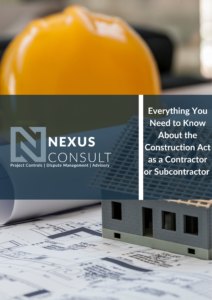What happens when disputes cannot be avoided?
Despite the best efforts (or not) of parties to a construction contract, sometimes disputes arise. However, this does not necessarily mean the dispute will head straight to litigation or arbitration.
For many years, there has been a growing dissatisfaction in being unable to resolve disputes timely and cost effectively. This has led to alternative forms of dispute resolution. Methods include:
- Informal and generally non-binding negotiation.
- Mediation.
- Conciliation.
- Project dispute boards.
- Early neutral evaluation.
- Interim awards.
- Adjudication.
- Litigation.
- Arbitration.
There are a number of options available. Which one you might choose will depend on the position in which you find yourself. In this article, we take a look at some of the options and their pros and cons.
Negotiation
Negotiation is often a sensible starting point. Although not binding, it can be incorporated into the construction contract at the outset. Alternatively, parties can simply agree to negotiate as disputes begin to escalate during the project.
Negotiation aims for avoidance or early resolution of disputes. The parties are encouraged to communicate directly to find a solution both parties can agree to. Parties can handle the process themselves or bring in someone to handle negotiations on your behalf.
It is the most cost effective option and helps resolve disputes early on, before too much time and money has been spent. It is also the most flexible method of dispute resolution. However, to be successful, it does require both parties to co-operate with the process. Both parties will usually be required to move from their default positions.
Mediation
Mediation is similar to negotiation but involves the presence of a neutral third party – the mediator. Mediators are skilled individuals whose role in the dispute resolution process is to help the parties come to a compromise. This presence of an external third party is often why mediation can succeed when negotiations fail.
Both parties are able to speak freely and confidentially to the mediator. This means the mediator will have a view of the bigger picture and can help parties come to a commercially sensible solution. However, a mediator does not have the power to enforce a decision.
Parties can choose a mediator with a technical background. This will assist if the the issues in the dispute are particularly complex. A skilled mediator is able to build trust between parties. If that trust cannot be built, mediation may not be successful.
Adjudication
Depending on the jurisdiction of your construction contract, adjudication can be a statutory right. In other circumstances, adjudication is often written into contracts. Often called ‘rough justice’, adjudication offers a fast decision, usually on time and money disputes. The process is designed to keep cash flow moving. This in turn should lead to fewer delays whilst issues between parties are ongoing.
An adjudicator is selected by the parties and named in the contract. Alternatively, they can be appointed by one of the panels which exist to help parties appoint dispute resolvers. This allows parties to choose an adjudicator with relevant skills and experience. They decide on the matters put forward by the parties based on the evidence available.
The process is usually less costly than arbitration or litigation. However, due to the tight timescales, issues to be determined are usually quite tightly limited. An adjudicator’s decision is binding. Usually they are upheld by the courts if a subsequent enforcement decision is required. The exception being cases where the adjudicator did not have sufficient jurisdiction to deal with the matter, or where the decision represents a breach of ‘natural justice’.
Arbitration
Unlike litigation, arbitration is a private form of dispute resolution. As Sir John Donaldson MR once described,
“Arbitration is usually no more and no less than litigation in the private sector. The arbitrator is called upon to find the facts, apply the law and grant relief to one or other or both of the parties” .
Most standard construction contracts contain arbitration clauses. These provide the parties with the contractual right to refer a dispute to arbitration.
In the process, an arbitrator, or panel of arbitrators, is appointed either by the parties – or by the court if the parties cannot agree. Like adjudicators and mediators, the arbitrator will be impartial. The parties may wish to choose someone with a particular skill set or background.
The process can be lengthy, and for particular complex disputes mimic the litigation process somewhat. Therefore it is often costly. However, the decisions of an arbitrator are binding upon the parties. Additionally, they remain private which may be attractive in confidential or commercially sensitive disputes.
Litigation
This process is regarded as providing the highest quality of decision making. However, such advantages come with the potential of greater costs and lengthy proceedings. Details of the parties and dispute are also made public. At the end of the litigation process the parties receive a binding judgement.
So which process is right for you?
As always with these choices, it comes down to the specifics of the dispute. You need to consider the strength of your position as well as the potential cost or disruption of formal dispute proceedings. It is also important to consider wider commercial relationships.
This is where experienced dispute resolvers can support you. Good advice can help you make the right commercial decision for you.
We can help you consider your position and help you weigh up the options available to you. Our team have been helped clients in all methods of dispute resolution as either party representatives or as part of the clients dispute support team.
If you are concerned that your project is heading to dispute, allow us to assess your claims and entitlement, and advise on your next steps.
Visit our dispute services page to find out more.



